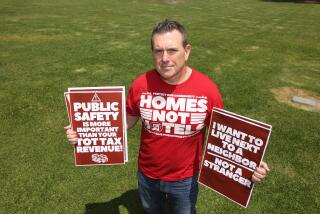Councilman Wants to Pull Plug on Outgoing Calls at Pay Phones to Hamper Drug Dealers
- Share via
LONG BEACH — A city councilman is looking to hit drug dealers right where they live--in the phone booth.
Long Beach police estimate that as many as three-quarters of all drug deals are arranged on pay telephones, prompting police to have some phones torn out in spots where drug peddlers swarm.
For the record:
12:00 a.m. Oct. 15, 1989 For the Record
Los Angeles Times Sunday October 15, 1989 Home Edition Long Beach Part J Page 3 Column 3 Zones Desk 2 inches; 40 words Type of Material: Correction
Pay Telephones--Long Beach Councilman Wallace Edgerton has proposed a study on restricting incoming calls on certain pay telephones to try to put a crimp in drug deals. A headline in the Times Long Beach section Thursday incorrectly described the type of calls that would be restricted.
Now, 2nd District Councilman Wallace Edgerton wants to study a plan that would restrict certain pay phones in the city to outgoing calls to put a crimp in the two-way communication necessary to close a drug deal.
“There has been a proliferation of these small-time punk dealers and the impact on the neighborhoods is extremely negative and frightening,” Edgerton said. “Obviously phones don’t cause drugs and you are not going to resolve the drug problem by trying to affect utilization of phones. But you have to make it as difficult for them as possible.”
Pay phone calls are nearly impossible for police to trace, and the sheer volume of calls placed on a single phone provides a convenient cover for drug runners, police say.
GTE can, upon request, intercept incoming calls by dismembering the bell or programming the central computer to block the line, said Pat Doherty, public communications manager.
The idea has gained increasing popularity in the last year as cities search desperately for ways to fight the losing battle against drugs. Of 40,000 GTE pay phones across the state, 200 are restricted, sometimes at the request of government agencies or private businesses who said the phone was a nuisance.
There are 42 restricted phones in Long Beach, seven sought by city agencies that believed the phone was attracting riffraff or being used to commit crimes. A “handful” of others were pulled out entirely because of crime problems, Doherty said.
Other cities have reported some success in breaking up loitering around public phones in drug-plagued neighborhoods, GTE spokeswoman Robin Koons said.
But neither police nor phone company officials could say whether altered phones are interfering with the local drug trade. In fact, Edgerton and Long Beach police officials were unaware that some local phones had already been snipped.
Edgerton is asking the city attorney and city manager to further study the concept and report back to the full council. He said the idea was suggested at Neighborhood Watch meetings where residents complained that drug dealers have taken over pay phones in some areas.
“This thing is forcing us into an armed camp with barred windows and senior citizens afraid to walk outside,” the councilman said. “So where do you begin? This is a tiny thing, but it may be of some help.”
Local police said they do not expect restricted phones to solve the city’s exploding drug problem. “You plug one hole and they seem to find another one,” Deputy Police Chief David Dusenbury said.
But the police appreciated the thought, nevertheless.
“We welcome any suggestion that may frustrate the bad guy for awhile at least,” said Lt. George Miller of the drug investigation section.
The bad guys may not be the only ones frustrated, however.
Public convenience is the main mission of pay telephones and restricting them puts a burden on residents in poor communities who often have no private phones, and on business people who rely on pay phones while on the road, GTE officials acknowledged.
In Ventura, where several GTE phones are restricted, the police themselves are unable to use pay phones to field calls from dispatchers, as they do a dozen times a shift, said Sgt. Steve Bowman of the narcotics section. He said he had no idea the purpose was sometimes to foil drug deals.
Edgerton said he also may seek restrictions on electronic pagers, which, authorities say, are mandatory for serious drug dealers. Police have reported children carrying beepers to elementary school so they can leave campus to run drugs.
“What does a kid 8, 9 or 10 need with a beeper?” Lt. Miller asked.
Edgerton said restricting the beepers, which rely on radio frequencies, would probably require state or federal legislation, but he intends to explore the area anyway.
More to Read
Sign up for Essential California
The most important California stories and recommendations in your inbox every morning.
You may occasionally receive promotional content from the Los Angeles Times.













